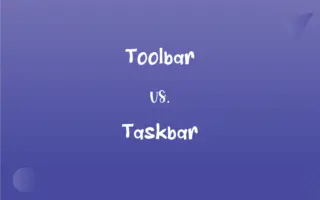SQL vs. HQL: What's the Difference?
Edited by Aimie Carlson || By Janet White || Published on March 6, 2024
SQL (Structured Query Language) is a standard language for accessing and manipulating databases, while HQL (Hibernate Query Language) is an object-oriented query language used in the Hibernate framework.

Key Differences
SQL is a standardized language widely used for querying and modifying data in relational database management systems (RDBMS). It works directly with tables, rows, and columns in databases. HQL, or Hibernate Query Language, is specific to the Hibernate framework and is used to query objects rather than tables, making it more oriented towards object-relational mapping (ORM).
SQL is database-independent and can be used with various RDBMS like MySQL, SQL Server, PostgreSQL, etc. It follows a standard syntax for database operations. HQL, being part of Hibernate, is more Java-centric and is designed to work within the Hibernate framework, which is an ORM tool for Java.
SQL commands include SELECT, INSERT, UPDATE, DELETE, etc., which directly operate on database tables. HQL queries, on the other hand, are translated into SQL queries by the Hibernate framework, allowing developers to focus on the Java objects rather than database specifics.
SQL requires the developer to be aware of the database structure and write queries accordingly. HQL simplifies this by allowing queries on Java objects, which Hibernate then translates into SQL to interact with the database, abstracting the database complexity.
SQL is used universally in database management and is essential for any database-related operation. HQL is specialized and primarily used in applications developed using the Hibernate framework, providing an efficient way to handle database transactions within a Java application.
ADVERTISEMENT
Comparison Chart
Nature
Standard database query language
Object-oriented query language for Hibernate
Scope
Database-independent, used with many RDBMS
Specific to Hibernate framework
Query Focus
Directly on tables, rows, and columns
On Java objects mapped to database tables
Primary Use
Universal in database management
Specific to Java applications using Hibernate
Syntax
Standard SQL syntax
Object-oriented, similar to SQL
ADVERTISEMENT
SQL and HQL Definitions
SQL
SQL is a language for managing and querying relational databases.
SELECT * FROM users WHERE age > 30; is an SQL query.
HQL
It is specific to Java applications using Hibernate ORM.
HQL is used within Java programs to interact with databases.
SQL
SQL is standardized and works across various database systems.
SQL commands remain consistent across different databases.
HQL
It allows object-oriented representation of queries.
HQL lets you query Java objects instead of database tables.
SQL
SQL interacts directly with tables in a database.
The SQL UPDATE command modifies existing database records.
HQL
HQL abstracts the complexity of SQL in Java development.
With HQL, developers focus on objects, not SQL syntax.
SQL
It is essential for database design and management.
SQL is used for creating and maintaining database schemas.
HQL
HQL queries are translated into SQL by the Hibernate framework.
Hibernate converts HQL queries to SQL for database operations.
SQL
It allows data insertion, query, update, and deletion in databases.
Use SQL's INSERT command to add a new record.
HQL
HQL is a query language for databases in the Hibernate framework.
FROM Employee WHERE salary > 50000 is an HQL query.
FAQs
What is SQL used for?
SQL is used for querying and modifying data in relational databases.
Does HQL work outside of Hibernate?
No, HQL is specifically designed for the Hibernate framework.
Can SQL be used with NoSQL databases?
Generally, no. SQL is designed for relational (SQL) databases.
Is HQL easier to use than SQL for Java developers?
HQL can be easier for Java developers as it integrates with Java objects.
Is HQL specific to a programming language?
Yes, HQL is specific to Java in the context of the Hibernate framework.
Is SQL knowledge necessary for database management?
Yes, SQL is fundamental for managing relational databases.
Does HQL support all SQL functionalities?
HQL supports many SQL features but is focused on object-oriented querying.
Can HQL be used for complex database transactions?
Yes, HQL can handle complex transactions within the Hibernate framework.
Do SQL queries work the same in all databases?
The core of SQL is standard, but there can be database-specific extensions.
Is SQL learning essential for software development?
For roles involving database interaction, SQL knowledge is crucial.
Is SQL used in web development?
Yes, SQL is widely used in web development for database interactions.
Can you use SQL in a Java application without Hibernate?
Yes, SQL can be used in Java applications without Hibernate.
How does HQL improve Java database interaction?
HQL simplifies database interactions by using Java object syntax.
Are SQL queries database platform-dependent?
Basic SQL syntax is standard, but some features may vary by platform.
Do you need to know SQL to use HQL effectively?
Basic SQL understanding is beneficial for using HQL effectively.
Are SQL skills relevant in data science?
Yes, SQL is important in data science for data extraction and manipulation.
Can HQL queries be used for database administration?
HQL is more suited for data manipulation within Hibernate, not for admin tasks.
Is learning HQL beneficial for all Java developers?
It's beneficial for those using Hibernate in their Java applications.
How does HQL handle SQL injection risks?
Hibernate's HQL is designed to minimize SQL injection risks.
Can HQL replace SQL in all database operations?
HQL is tailored for Hibernate and is not a complete replacement for SQL.
About Author
Written by
Janet WhiteJanet White has been an esteemed writer and blogger for Difference Wiki. Holding a Master's degree in Science and Medical Journalism from the prestigious Boston University, she has consistently demonstrated her expertise and passion for her field. When she's not immersed in her work, Janet relishes her time exercising, delving into a good book, and cherishing moments with friends and family.
Edited by
Aimie CarlsonAimie Carlson, holding a master's degree in English literature, is a fervent English language enthusiast. She lends her writing talents to Difference Wiki, a prominent website that specializes in comparisons, offering readers insightful analyses that both captivate and inform.






































































